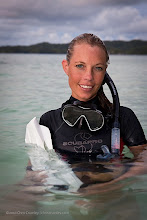So you don’t eat shark fin soup or live in a country that considers it part of its culture? Doesn’t matter. You can still make a difference in the shark issue and save your share of the 100,000,000 killed a year.
Most likely, the sale of shark products is legal in your town, yes -
your town. The local restaurants, grocery stores, health food stores, beauty salons and even pet stores may sell shark. Chances are also good your country is also responsible for the supply. Shocked? Believe it. The US, UK, France, Spain, and Portugal join Indonesia, Taiwan and Japan in the top 20 largest shark fishing nations.
Even if your country isn’t on the list, sharks and their habitats probably aren’t effectively protected – did you know Australia allows commercial shark fishing in the Great Barrier Reef – a World Heritage Site? And, no matter where you live, the myths about sharks as bloodthirsty man-eaters are being perpetuated – dangerous mis-truths standing in the way of their conservation.
Think sharks are evil re-incarnated? Watch this video, then say that. So, here are ten easy things you can do:
# 1) Do not consume or purchase shark - it’s dangerous. It isn’t just the soup. Do not eat shark steaks or meat, don’t buy any shark or stingray leather products, leave the shark teeth and jaws in live sharks – where they belong.
This isn’t just for the sharks’ health – it’s for yours. Shark meat (including fins) carries warnings due to its high mercury levels from the U.S. Food and Drug Administration, the Environmental Protection Agency, the Environmental Defense Fund, and the World Health Organization. If you want to know what mercury does, just google “mercury poisoning” and prepare to be horrified. Still want to eat it?
# 2) Volunteer your time.
Become a spokesperson or local organizer for our campaigns. Give a presentation at a school or event. (Its easy.
Shark Angels or
Shark Savers can provide them – or just grab this one off
SlideShare.)
# 3) Be aware, informed consumers. Know what you are buying. Often shark is relabeled as other types of fish, like rock salmon, included in fish patties like pollock, or hidden from consumers – as shark ingredients are not always labeled like chondroitin which can be made from shark cartilage.
# 4) Take your business elsewhere.Do not support any restaurant or store that sells shark products or shark fin soup and inform them of your concerns. Educate them about why you are making this choice and ask them to make the same decision.
# 5) Support the cause.Join and donate to shark conservation organizations. There are many ways to save sharks (science & research, direct action, legislation, grass roots activism.) Find an organization you identify with and don’t just join them – make a donation. They desperately need funding. A few of my favorites include:
Shark Savers,
Sea Shepherd, and
WildAid – but chose the one right for you.
# 6) If you must eat it, only eat shark-friendly fish. Since over ½ of the 100,000,000 sharks caught yearly are caught as by-catch, only eat sustainably caught seafood – or better, don’t eat anything from the seas.
If you do eat fish, download a sustainable seafood card and carry it with you. Most likely, one exists. You may even be able to download a
cool iPhone App - like the one from Monterey Bay. You can even
SMS a database of sustainable choices when out and about in South Africa, so I am quite certain no matter where you are, there are NO excuses not to make informed decisions.
# 7) Spread the enlightenment. Increase your Shark IQ. Learn more then teach others. Host a local screening of
Sharkwater then a have discussion afterwards.
Shark Savers makes it easy to do from invitations to a discussion guide.# 8) Keep sharks out of your cosmetics.
Never use any products (including makeup, lotions and deodorants) that contain Squalene - shark liver oil. In fact, just buy cruelty free.
# 9) Develop a voice.
Be heard. Blog, write articles, appeal to media outlets and help dispel the myths. Don’t support media outlets that demonize sharks.
Sharks aren't evil re-incarnated. Watch this video. # 10) Make your vote count.Even if you aren’t living in country that is heavily consuming sharks, chances are, your country is part of the problem. The US and many countries in the EU are responsible for catching more sharks than most other countries in the world. Support legislation that stops shark fishing, protects shark habitats, and ends overfishing. It’s not just about the sharks – it’s about the oceans.

And, bonus points if you make sharks more valuable alive than dead and support responsible (strong emphasis here) shark diving tourism. But that is a blog for a different day.
You can and should make a difference before there aren’t sharks left. In fact a recent IUCN report has identified over 1/3 of all shark species (more than 400 in total) are facing extinction – some in our lifetimes. Destroying sharks and the oceans isn't a legacy I want to leave for future generations. You?

 It has been a hectic year indeed! Fin Free, the campaign, launched, Shark Angels has taken flight in a big way with thousands of angels around the world, I became a face for ScubaPro, and I started United Conservationists with Rob Stewart, award winning director of Sharkwater! Phew.
It has been a hectic year indeed! Fin Free, the campaign, launched, Shark Angels has taken flight in a big way with thousands of angels around the world, I became a face for ScubaPro, and I started United Conservationists with Rob Stewart, award winning director of Sharkwater! Phew.
 News
News
 News
News





 (
(























.jpg)

.jpg)

.jpg)


